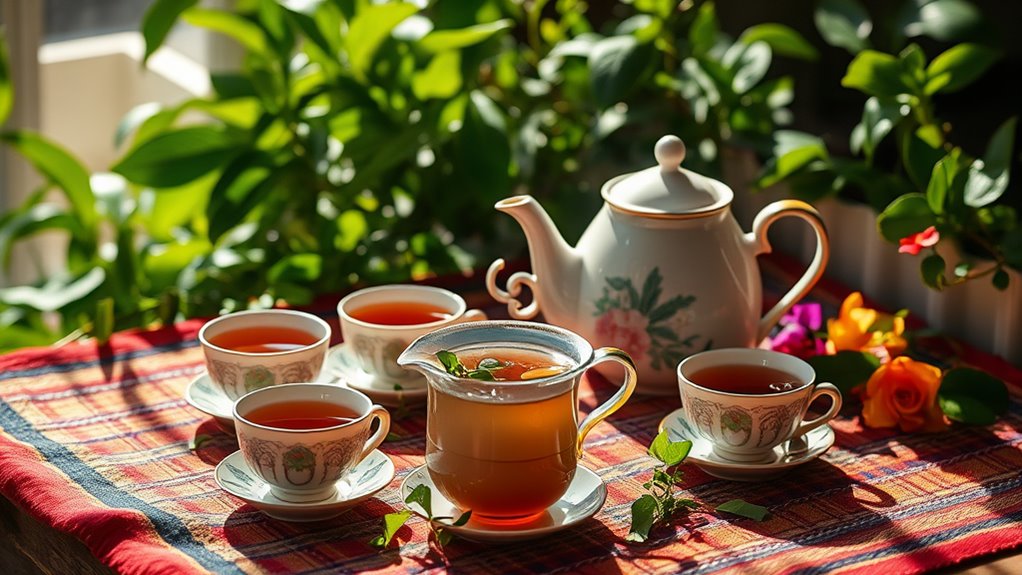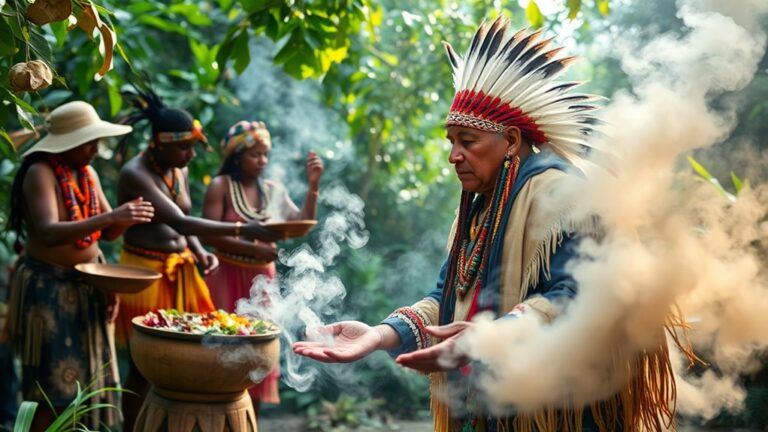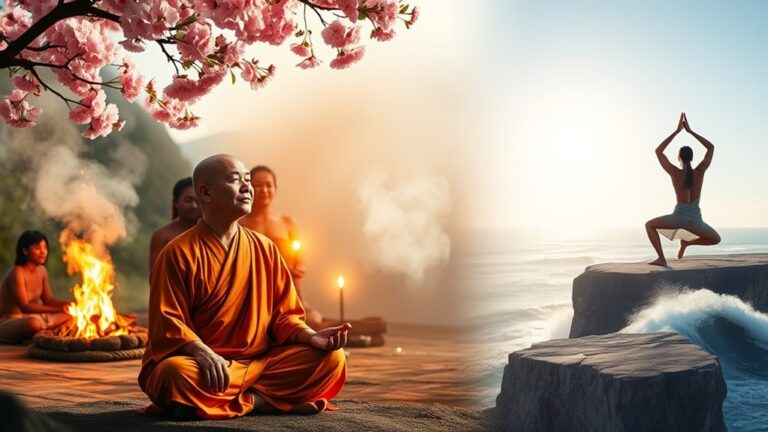Tea plays an essential role in cultural wellness rituals, serving as a bridge that connects communities through shared experiences. From the Japanese tea ceremony’s meditative practices to India’s chai culture fostering hospitality, tea rituals promote mindfulness and emotional well-being. British afternoon tea and Chinese traditions emphasize social connection and harmony, while herbal teas offer therapeutic benefits rooted in local heritage. Exploring these diverse practices reveals the profound impact tea has on health and well-being across cultures.
Nomad Highlights
- Tea rituals enhance mindfulness by encouraging participants to engage in intentional movements and reflections, fostering mental clarity and emotional awareness.
- Various cultures incorporate tea into wellness practices, linking herbal blends to local traditions and promoting healing through sensory experiences.
- The preparation and serving of tea serve as a communal activity, reinforcing social bonds and creating a sense of belonging within communities.
- Mindful sipping of tea transforms the act into a meditative experience, emphasizing presence and self-care while promoting relaxation and personal growth.
- Modern adaptations of tea rituals, including personalized blends, enhance holistic health, encouraging individuals to prioritize their well-being through intentional practices.
The Historical Significance of Tea in Cultural Practices
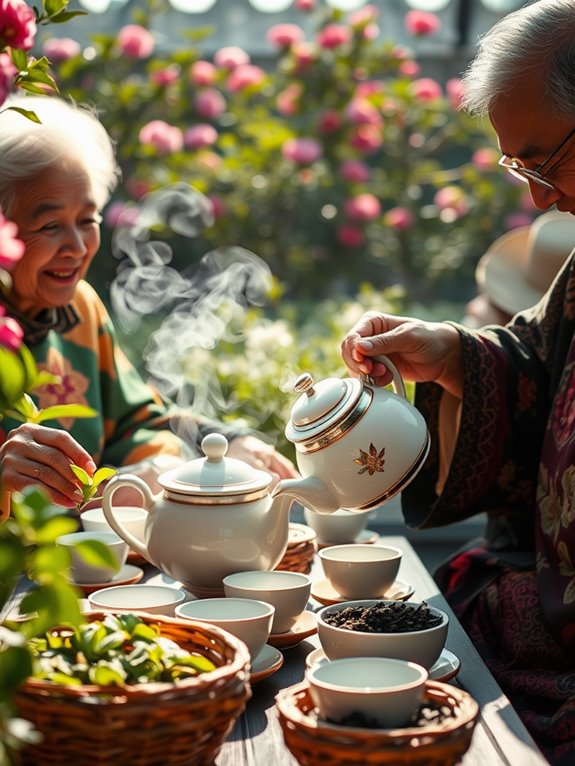
For centuries, tea has woven itself into the fabric of various cultures, serving not just as a beverage but as a symbol of hospitality, ritual, and social connection. The tea trade has influenced economies and facilitated cultural exchanges, transforming simple leaves into powerful commodities. In many societies, tea isn’t merely consumed; it’s celebrated through elaborate rituals, showcasing its ceremonial significance. Each culture imbues its brewing and serving practices with meaning, from the intricate ceremonies of the Chinese to the communal gatherings in England. These traditions foster connection and mindfulness, inviting participants to slow down and savor the moment. Additionally, the incorporation of essential oils in tea rituals can enhance the aromatic experience, promoting relaxation and well-being. Furthermore, the act of brewing tea can be considered a form of mindful exercise that encourages individuals to focus on the present and engage their senses. Herbal teas, known for their calming effects, can further elevate these rituals by promoting relaxation and improving sleep quality. The use of high-quality ingredients in herbal blends enhances their effectiveness and flavor, making them a cherished part of these cultural practices. Moreover, these rituals can also serve as effective tools for personal growth and emotional resilience, encouraging participants to reflect on their thoughts and feelings.
Japanese Tea Ceremony: A Journey of Mindfulness
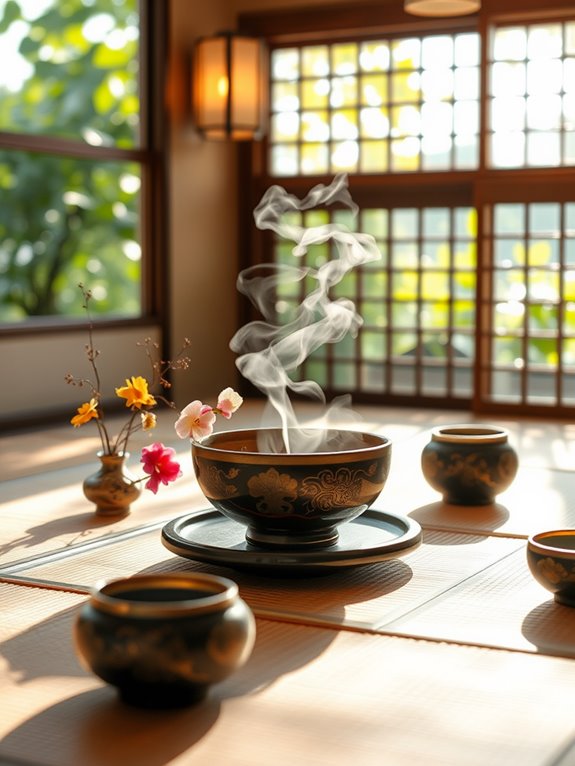
As you step into the serene world of the Japanese tea ceremony, you’ll encounter a rich tapestry of history and significance woven into each deliberate movement. The rituals and practices serve not just to prepare tea, but to cultivate a profound sense of meditation and mindfulness that transcends the act itself. Here, every gesture invites you to pause, reflect, and connect with the present moment. This mindful approach mirrors the principles of acupressure mats, which also promote relaxation and well-being through intentional self-care practices. Engaging in such rituals can enhance your experience of muscle relaxation and overall wellness, much like the benefits derived from acupressure mats. Additionally, the emphasis on self-awareness in these rituals fosters a deeper understanding of one’s emotions, enriching the overall experience. Incorporating practices like mindfulness journaling can further deepen your connection to this intentional state of being. Such practices can also lead to improved core strength and balance, enhancing overall physical wellness.
History and Significance
While many traditions celebrate the act of drinking tea, the Japanese tea ceremony stands out as a profound expression of mindfulness and cultural heritage. Its ancient origins trace back centuries, evolving from simple tea-drinking practices into a meticulously structured ritual.
Each movement and gesture carries ceremonial importance, inviting participants to engage deeply with the present moment. You’ll find that the aesthetics of the tea room, the selection of utensils, and the meticulous preparation of matcha all reflect a philosophy rooted in harmony, respect, purity, and tranquility. This ritual also highlights the importance of unique products that enhance the tea experience, such as handcrafted tea sets and premium matcha. Additionally, the selection of high-quality teas, like herbal sleep teas, contributes to the overall sensory experience and promotes relaxation. Engaging in such rituals can also lead to a greater appreciation for therapeutic benefits associated with mindfulness practices. The careful preparation and presentation of tea can also emphasize the significance of multi-layer insulation in maintaining the optimal temperature of the beverage.
This isn’t just about sipping tea; it’s about experiencing a meditative journey that fosters connection and introspection. As you participate, you embrace not only the beverage but also centuries of cultural wisdom and collective consciousness. Additionally, the ritual promotes cultural wellness by enhancing one’s sense of belonging and appreciation for heritage.
Rituals and Practices
The Japanese tea ceremony, or Chado, embodies a rich tapestry of rituals and practices that elevate tea drinking into an art form of mindfulness.
Through intentional movements and meticulous attention to detail, you engage in ceremonial practices that foster a deep connection with both the tea and your surroundings. This mindful engagement mirrors the benefits of coloring books as a therapeutic tool for stress relief. Each step, from the selection of utensils to the precise whisking of matcha, serves as a reminder of the present moment, reminiscent of the organization and accessibility crucial in first aid kits, which enhances response during emergencies. Engaging in such mindful rituals can also reflect the values found in self-care planners, which encourage personal reflection and well-being. Additionally, these practices promote mindfulness and focus, reducing anxiety levels and enhancing mental clarity.
This immersive experience offers profound wellness benefits, promoting relaxation and mental clarity.
As you participate, you’re not just tasting tea; you’re cultivating a sense of harmony and balance within yourself.
In this innovative approach, Chado transforms a simple act into a pathway for personal growth and cultural appreciation, similar to how calming essential oil blends can enhance overall relaxation and well-being.
Meditation and Mindfulness
Engaging in the Japanese tea ceremony invites you on a profound journey of mindfulness, where each movement and gesture is a step toward deeper awareness.
As you participate, you’ll find yourself immersed in an art form that emphasizes mindful sipping—each sip becomes a meditation, allowing you to savor the intricate flavors and aromas. The anti-glare technology employed in screen protectors enhances visibility in bright environments, similar to how the tea ceremony creates clarity in mental focus. The practice of tea drinking also highlights the importance of cultural wellness rituals that promote well-being across various cultures. Furthermore, the tea ceremony showcases how unique products can enhance the sensory experience, enriching the ritual even more. Engaging with tea accessories can elevate your experience, making each moment feel even more intentional and special.
The ritual of preparing and serving tea encourages tea visualization, creating a serene mental landscape where distractions fade away.
You’ll notice how each action, from whisking the matcha to the gentle clinking of cups, fosters a connection to the present moment.
This practice not only cultivates tranquility but also inspires creativity, making the tea ceremony a transformative experience that transcends mere beverage preparation and evolves into a holistic wellness ritual. Additionally, the quiet operation of the tea ceremony mirrors the tranquil atmosphere sought in many wellness practices, enhancing the overall experience.
Chai: The Heart of Indian Hospitality
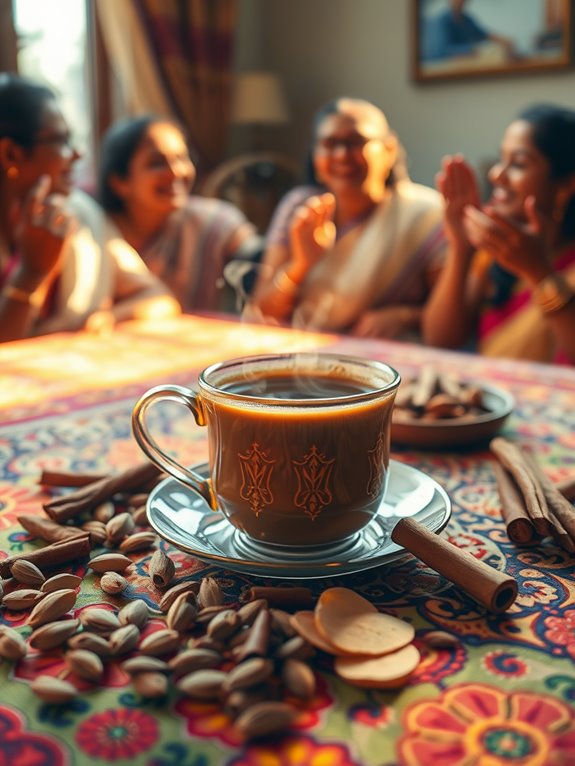
When you step into an Indian home, the aroma of freshly brewed chai often envelops you, instantly making you feel welcome and at ease. This cherished beverage is more than just tea; it’s a symbol of hospitality customs deeply woven into the fabric of Indian culture. Chai rituals invite connection and conversation, transforming a simple moment into a shared experience. As you sip the spiced concoction, you’ll notice how it fosters warmth and belonging, bridging gaps between strangers and friends alike. Each cup is a reflection of the host’s care, showcasing their desire to make you feel at home. In this situation, chai transcends mere refreshment, becoming an essential element of cultural wellness and communal harmony. The experience of enjoying chai can be enriched by discovering unique products for tea enthusiasts, enhancing the ritual and deepening the appreciation for this beloved beverage. Additionally, the variety of tea blends and accessories available can elevate your chai experience, making it even more memorable. Furthermore, the tradition of sharing chai also emphasizes the importance of community bonding, illustrating how such rituals strengthen relationships and foster a sense of belonging. This communal aspect is further highlighted by the cultural significance of tea, which plays a vital role in bringing people together across diverse backgrounds. Meditation cushions can also enhance this experience by providing a comfortable space for sharing and enjoying chai together, promoting relaxation and connection.
British Afternoon Tea: A Social Ritual
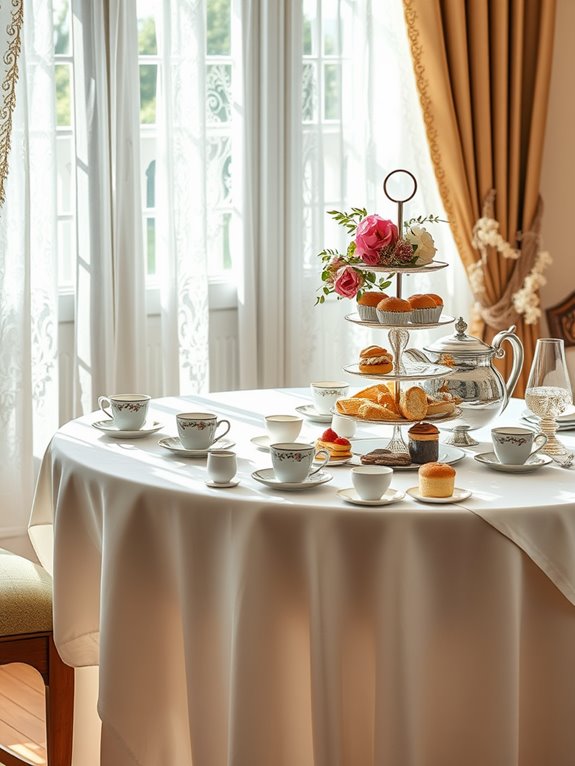
Five o’clock signals a delightful tradition in British culture: afternoon tea. This cherished ritual isn’t just about sipping tea; it’s a celebration of afternoon etiquette and social gatherings.
Picture yourself in a cozy parlor, surrounded by dainty sandwiches, scones, and pastries, each bite an invitation to connect. You engage in light conversation, sharing laughter and stories, nurturing relationships that flourish over this timeless experience. This communal setting is reminiscent of aromatherapy diffusers that enhance the atmosphere, creating a calming environment for conversation. Just like the essential oil diffuser that can transform your space, afternoon tea transforms social interactions into cherished memories. The addition of unique tea blends can further elevate this experience, introducing new flavors and aromas that spark conversation. Incorporating high-quality tea leaves can significantly enhance the overall taste and aroma, making each cup a sensory delight.
Afternoon tea serves as a momentary escape from daily stress, enhancing well-being through social interaction. As you embrace this elegant tradition, you’re not just partaking in a meal; you’re participating in a cultural phenomenon that fosters community and mindfulness. The experience is further enriched by unique products that elevate the tea-drinking experience, offering everything from exquisite teapots to artisanal blends.
In a fast-paced world, this ritual reminds you of the beauty of slowing down and savoring life’s simple pleasures.
Chinese Tea Culture: Harmony Through Tradition
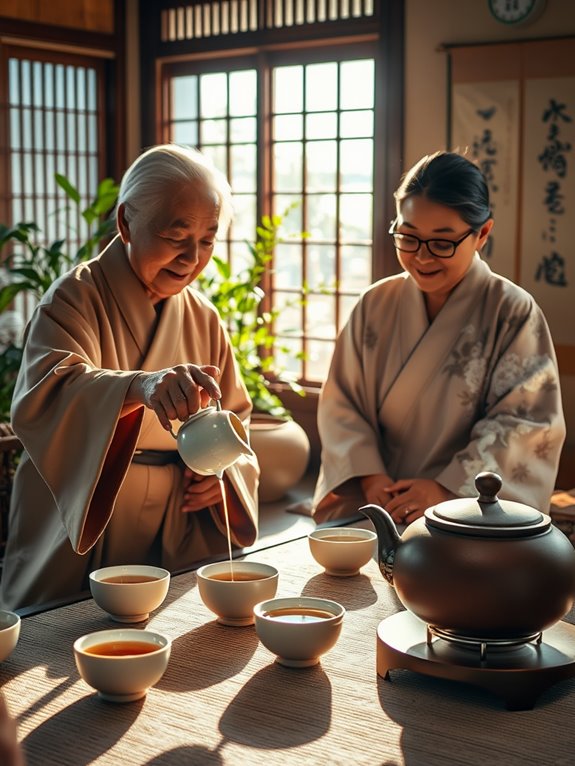
While steeping a fragrant cup of tea, you immerse yourself in the rich tapestry of Chinese tea culture, where every sip embodies centuries of tradition and philosophy.
The art of tea ceremonies reveals a profound connection to nature and community, emphasizing harmony and respect. As you partake, notice how tea symbolism, from the delicate leaves to the elegant vessels, reflects balance and tranquility.
Each gesture during the ceremony is intentional, fostering mindfulness and a sense of presence. This ritualistic approach not only elevates the experience but also cultivates a deeper understanding of oneself and the world.
Every intentional gesture in the ceremony deepens mindfulness, offering a profound connection to oneself and the world around us.
Engaging with this ancient practice invites you to discover innovation within tradition, harmonizing your modern life with timeless wisdom.
Herbal Teas and Wellness: Global Perspectives
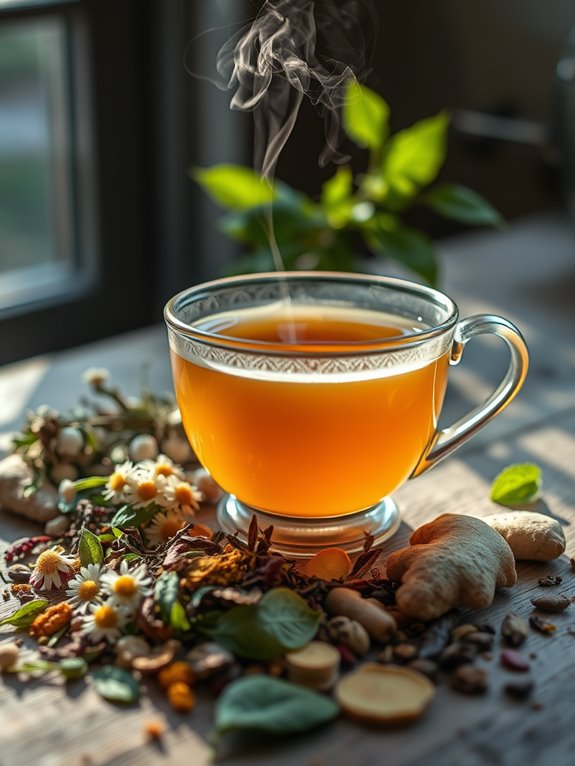
Herbal teas hold a unique place in cultures around the world, often intertwined with traditions and rituals that promote wellness.
You’ll find that each region boasts its own specific blends, celebrating local flora while highlighting their powerful healing properties.
As you explore these global perspectives, you’ll uncover how these teas not only nourish the body but also enrich the soul through their cultural significance.
Cultural Significance of Herbal Teas
As you explore the diverse cultural significance of herbal teas across the globe, you’ll discover that these brews serve more than just a soothing beverage; they embody traditions, rituals, and healing practices.
In many cultures, herbal traditions have evolved, intertwining with daily life and wellness benefits. For instance, in Chinese culture, chrysanthemum tea symbolizes peace and promotes clarity, while in India, tulsi tea is revered for its stress-relieving properties.
Each infusion not only nurtures the body but also strengthens social bonds during gatherings. You’ll see how these herbal concoctions connect people to their heritage, inviting innovation in wellness rituals.
Healing Properties Across Regions
Tea has long been recognized for its healing properties, varying across cultures and regions, each offering unique benefits that reflect local traditions and environmental resources.
You’ll discover that different healing teas can enhance your wellness journey in innovative ways:
- Chinese Chrysanthemum: Known for its cooling properties, it alleviates inflammation and promotes eye health.
- Indian Tulsi (Holy Basil): Revered for its adaptogenic qualities, it reduces stress and supports immune function.
- South African Rooibos: Rich in antioxidants, this caffeine-free blend aids digestion and promotes skin health.
Embracing these regional blends not only connects you with diverse cultures but also empowers you to explore holistic approaches to well-being.
Modern Adaptations: Tea in Contemporary Wellness Practices
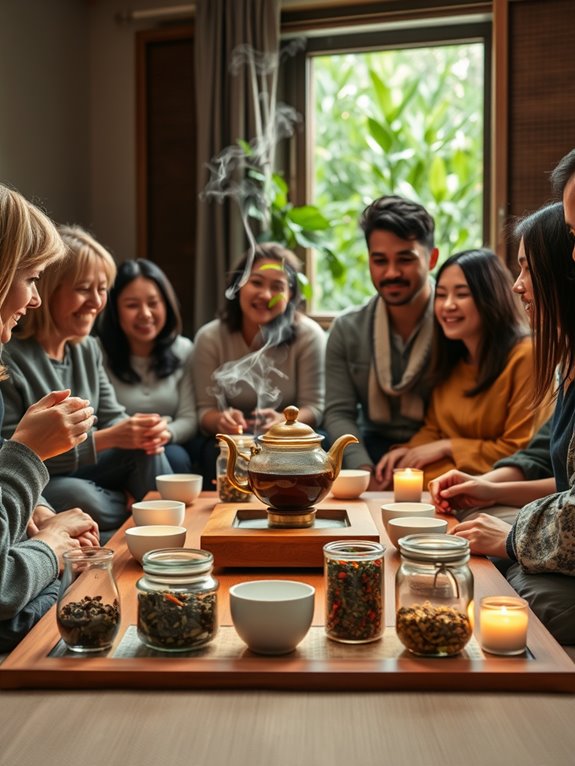
While many people have embraced the calming effects of tea for centuries, modern wellness practices have transformed its role into a versatile tool for holistic health.
You’re likely to find mindful brewing techniques that emphasize presence and intention, encouraging you to savor each sip. The art of tea blending has also gained traction, allowing you to customize brews with adaptogens, herbs, and spices tailored to your wellness goals.
These innovative approaches elevate tea from a simple beverage to a ritual of self-care, enhancing both physical and mental well-being.
Whether you’re partaking in a quiet morning routine or a community tea ceremony, these contemporary practices invite you to reconnect with yourself, nurturing a deeper relationship with this ancient elixir.
Frequently Asked Questions
What Types of Tea Are Best for Mental Clarity?
When you’re seeking mental clarity, green tea’s your best ally. Packed with L-theanine, it promotes focus while keeping anxiety at bay.
Herbal infusions like ginseng or peppermint can also sharpen your mind, offering invigorating alternatives for those who prefer caffeine-free options.
Experimenting with these teas can elevate your cognitive function, helping you stay innovative and alert.
How Can I Incorporate Tea Into My Daily Wellness Routine?
Incorporating tea into your daily wellness routine can transform a mundane moment into a mindful experience.
Start with intentional tea preparation, selecting blends that resonate with your mood. As the aroma fills the air, let anticipation build.
While brewing, take a moment to breathe deeply and appreciate the process. Once steeped, indulge in mindful sipping, allowing each sip to ground you.
This ritual not only nourishes your body but also cultivates a deeper connection to your well-being.
Are There Specific Teas for Emotional Healing?
Yes, there are specific teas that can aid in emotional healing. For instance, chamomile and lavender are known for their calming effects, helping you achieve emotional balance.
When you sip on these soothing blends, you’re not just enjoying a warm drink; you’re nurturing your mental well-being.
Additionally, rooibos offers a rich, caffeine-free alternative that can also support emotional stability.
Embrace these teas as innovative tools in your journey toward emotional healing and wellness.
What Role Does Tea Play in Meditation Practices?
When you incorporate tea into your meditation practices, you enhance your mindfulness experience.
Calming brews, like chamomile or green tea, create a serene atmosphere, allowing you to focus inward. The ritual of preparing tea can also ground you, centering your thoughts.
By sipping slowly, you deepen your awareness of each moment, transforming your meditation into a more profound journey.
Ultimately, tea becomes an essential companion in cultivating tranquility and clarity during your practice.
Can Tea Rituals Enhance Social Connections?
Picture a warm cup of tea, steam curling like whispers of connection.
Tea gatherings create a cozy space for social bonding, where laughter flows as freely as the brew.
These rituals invite you to share stories, fostering deeper relationships.
As you sip, you’re not just enjoying a beverage; you’re participating in a timeless practice that strengthens community ties.
Embracing tea in your social life can transform ordinary moments into extraordinary connections.
Conclusion
In the tapestry of cultural wellness rituals, tea serves as a vibrant thread, weaving together tradition and connection. Whether you’re savoring the serene moments of a Japanese tea ceremony or the warmth of chai among friends, each sip invites you to embrace mindfulness and community. As you explore the diverse landscapes of tea, remember that it’s not just a beverage; it’s a vessel for harmony and healing, nurturing both body and spirit in an ever-evolving world.

